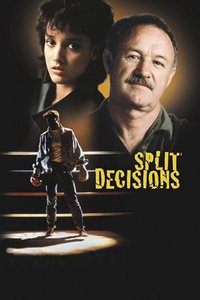Split Decisions (1988)

The 80s were a strange decade for fashion, what with dayglo clothes, big hair and even bigger shoulder pads. One sector of society brought this all together: bland American rock bands. Or, as it was said then: rawk bands. I say this because the theme tune from Split Decisions desperately wants to be the next Eye of the Tiger. It’s not; the tune and the rest of the film is little more than a cut-price amalgam of other, better 80s efforts.
Dont get me wrong: I like Craig Sheffer and Jeff Fahey, but they weren’t top-tier stars. They’re fill-ins for Patrick Swayze and Mickey Rourke. And Split Decisions itself is not even Rocky-lite, it’s more like a poor man’s All the Right Moves.
Irish-American brothers Eddie (Sheffer) and Ray (Fahey) McGuinn are boxers. Eddie has followed the path set out for him by his NYPD cop father (a truly wasted Hackman) and is the current Golden Gloves champion, with a bright future in college and in the Olympic boxing team. Ray has gone pro and fights in small clubs for less money than he spends on tacky leather jackets and bad shades. Eddie has his father and God in his corner. Ray has the Mafia and cheap prostitutes.
When Ray refuses to throw a fight and ends up murdered by the small-time hoods he has crossed, led by career nasty bald guy James Tolkan (Back to the Future, TV’s Nero Wolf), Eddie decides to turn pro to beat the man Ray was due to fight.
Split Decisions fails on all the most basic levels. For a sports movie, the fight scenes are few, brief and inauthentic, like when TV detective shows like Diagnosis Murder visit inner city gyms and the kids don’t spit, don’t swear and don’t smoke. For a drama, it lacks tension, pace and coherence. You can only assume that this is partly due to editing, as whole sub plots appear to have been cut to shreds.
Eddie begins to romance Ray’s ex (Beals, in what amounts to little more than a cameo), but that’s not explored and she seems curiously absent from the entire second half of the film. Ray has clearly been absent from the family for some time, but Eddie doesn’t spend more than three seconds deciding to throw away the Olympics and college to avenge his death. There was potential to expand further on the dynamic between Hackman and his two sons, but this is treated as glibly as everything else.
It’s hard to know where to begin criticising: cliché-ridden script, poor acting, pedestrian directing, wasted NYC location shooting, all building to a conclusion that’s telegraphed from the opening scenes. Yet, somehow, you do keep watching to the end. Waiting, hoping that Hackman will unleash some of his magic and redeem the film in some small way.
He doesn’t. Shame.